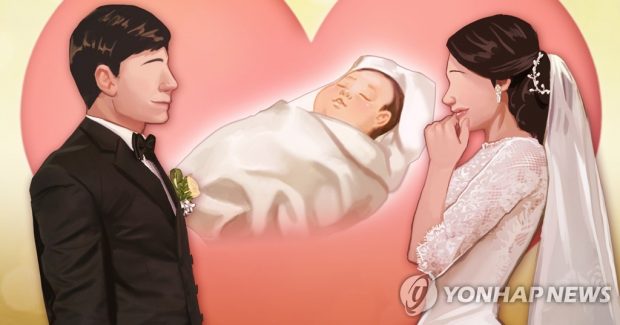Three in 10 Koreans think having kids unnecessary: survey

South Korea already has one of the world’s lowest birth rates (Yonhap)
SEOUL: More than three out of every 10 South Koreans believe it is unnecessary to have kids even after marriage, while parents spend nearly $300 a month on private education for each student in grades 12 or below, a report from the statistics office showed Thursday.
According to the report, based on a series of surveys and studies, 69.6 percent of those polled said having kids may be necessary after getting married.
The remaining 30.4 percent thought otherwise.
Statistics Korea has forecast the country’s population to peak at around 52 million in 2028 before beginning to decline. It estimates the country’s population to drop to as low as 39.3 million in 2067. It stood at around 51.7 million at end-2019.
Possibly reflecting a move toward a population reduction, the report also showed the average age of women giving birth for the first time here came to 31.9 years in 2018, up 0.3 year from a year earlier.
By gender, 33.4 percent of females surveyed said they do not think having a child is necessary, compared with 27.4 percent of males who said the same.
The report showed the higher the level of education a person has, the more likely he or she will be against the idea of having a child.
In the survey, 36.2 percent of people with college education or higher said they did not think having a child was necessary, while 29.3 percent of those with high school education said the same and 18.9 percent of those with only an elementary school education.
The report showed the cost of private education, which is partly blamed for the country’s low birth rate, continued to put increased burdens on local parents.
In 2019, 74.8 percent of all students enrolled in high school and below were getting private education outside of school, up 2.0 percentage point from a year earlier, while parents spent an average 321,000 won ($266) on private education for each student, up 30,000 won over the cited period.
The average life expectancy of South Koreans remained unchanged from a year before at 82.7 years in 2018.
The smoking rate of people aged 19 years or older also remained unchanged over the cited period at 21.1 percent, but the smoking rate of males dropped slightly to 35.8 percent while that of females inched up to 6.5 percent, according to the report.
The drinking rate of adults came to 57.8 percent in 2018, down 1.4 percentage points from the previous year.
YONHAP
























































